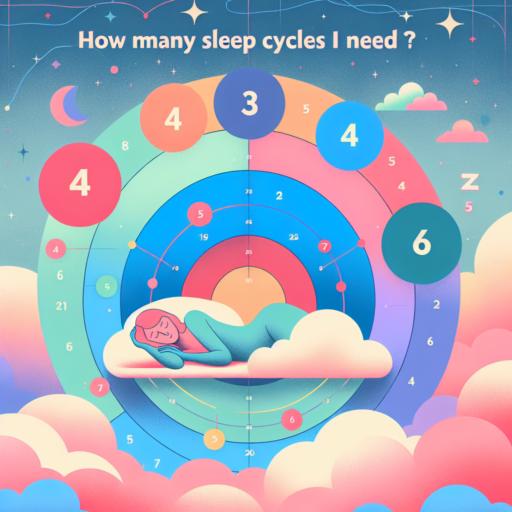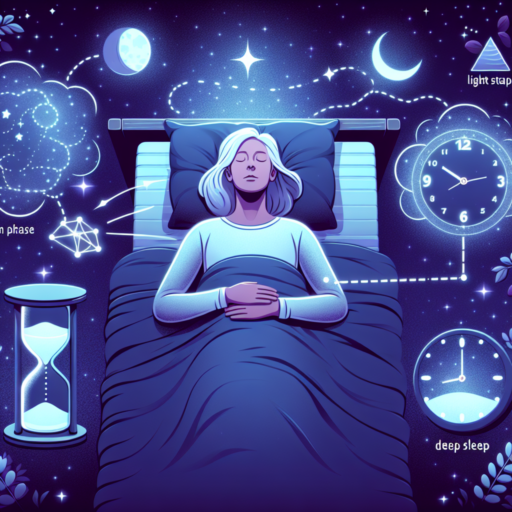Introduction to Sleep Cycles and Their Importance
Understanding the significance of the sleep cycles that constitute our nightly rest is crucial to appreciating the broader benefits they provide to our physical and mental health. Each cycle plays a pivotal role in rejuvenating our bodies and minds, preparing us for the day ahead. As we delve deeper into the intricacies of these cycles, it becomes evident how vital a proper sleep pattern is to our overall well-being.
At the heart of our sleep are several stages, each characterized by different brainwave activities and bodily functions. From the light sleep of the initial stages to the profound depths of REM (Rapid Eye Movement) sleep, our bodies undergo a comprehensive recovery process. This regeneration is key not only to energy restoration but also to memory consolidation, emotional regulation, and the fortification of the immune system.
The importance of understanding our sleep cycles extends beyond mere curiosity. It empowers individuals to make informed decisions about their sleep habits and hygiene, potentially unlocking significant improvements in health, mood, and cognitive function. Recognizing the roles of each sleep stage can guide us in optimizing our sleep environment and schedules for a more restful, effective sleep experience.
Understanding the Different Stages of Sleep
Understanding the different stages of sleep is crucial for recognizing how sleep affects our overall health and wellbeing. Sleep can be broadly divided into two main types: REM (Rapid Eye Movement) and non-REM sleep, which consists of three distinct stages. Each of these stages plays a vital role in supporting various physical and mental restoration processes.
Non-REM Sleep: The Foundation of Sleep
The first stage of non-REM sleep serves as the transition from wakefulness to sleep. During this time, the body begins to slow down its functions – heartbeat, breathing, and eye movements become slow, marking the lightest level of sleep. Progressing into the second stage, our bodies prepare for deep sleep through a further decrease in heart rate and relaxation of muscles. This stage is critical for physical revitalization. The third and final stage of non-REM sleep is the deepest, where the body performs its most profound healing and rejuvenation processes. Growth hormone is released, vital for growth and development, as well as muscle repair.
REM Sleep: A Unique Phase of Sleep
Following the stages of non-REM sleep, the sleep cycle culminates in REM sleep, approximately 90 minutes after falling asleep. During REM sleep, brain activity increases, resembling that of wakefulness. This stage is essential for cognitive functions such as memory consolidation and learning. Most dreaming occurs during REM sleep, where the body becomes temporarily paralyzed, likely a mechanism to prevent us from acting out our dreams.
Understanding these stages provides insight into the complexity of sleep and its essential role in our health. Each stage contributes uniquely to the body’s recovery and preparation for the day ahead. By appreciating the importance of each sleep phase, we can better recognize the signs of sleep deficiencies and the need for quality rest.
How Many Sleep Cycles Do You Really Need?
Understanding the number of sleep cycles you truly need is crucial for optimizing your rest and overall health. A sleep cycle, consisting of stages including both REM and NREM phases, typically lasts about 90 to 120 minutes. Most adults require between 4 to 6 cycles per night, translating to approximately 7 to 9 hours of sleep. This range, however, can be influenced by individual factors such as age, lifestyle, and overall health.
It’s important to note that not all sleep is created equal. The quality of your sleep and how it’s structured—into light sleep, deep sleep, and REM (Rapid Eye Movement) sleep—plays a significant role in how rested you feel. Achieving a balance across these cycles can greatly enhance your sleep quality. Thus, focusing merely on the quantity of sleep without considering its structure can be misleading when determining how many cycles you need.
Moreover, disruptions in sleep, such as waking up frequently throughout the night, can interrupt these cycles, reducing the quality of rest and the benefits that complete cycles confer. Therefore, maintaining a consistent sleep schedule and creating an environment conducive to uninterrupted sleep is as paramount as concentrating on the number of cycles. Strategies like limiting exposure to blue light before bedtime and ensuring your bedroom is a calm, quiet, and cool haven can help promote a more structured sleep pattern.
The Impact of Sleep Cycles on Health and Well-being
The intricate relationship between sleep cycles and an individual’s overall health and well-being is a subject of considerable importance and ongoing research. Sleep, far from being a passive state, is a complex, dynamic process that plays a crucial role in the regeneration, consolidation of memory, and various aspects of health maintenance. Understanding how sleep cycles impact our lives can lead to improved mental, emotional, and physical health.
At the heart of this relationship is the concept of the sleep cycle, which includes stages of light sleep, deep sleep, and REM (Rapid Eye Movement) sleep. Each cycle lasts approximately 90 minutes, and the quality and repetition of these cycles can significantly influence our daily functioning. A disrupted sleep cycle can lead to a myriad of health issues, ranging from simple fatigue to more severe conditions like obesity, heart disease, and diabetes. Furthermore, poor sleep quality is linked with mental health challenges, including depression and anxiety.
Interestingly, the benefits of a healthy sleep cycle extend beyond mere physical health. Enhanced cognition, improved memory, better mood regulation, and heightened emotional resilience are among the remarkable benefits of consistent, quality sleep. The role of deep sleep and REM stages in facilitating these benefits cannot be overstated; these stages are vital for brain health and overall well-being, countering the stressful elements of daily life and fostering a refreshed, energetic state of mind.
How to Calculate Your Ideal Number of Sleep Cycles
Understanding your body’s natural rhythm is essential for achieving optimal health and well-being. The concept of sleep cycles plays a crucial role in this regard. Each sleep cycle lasts about 90 minutes and includes different stages of sleep, from light sleep to deep sleep and REM (Rapid Eye Movement) sleep. By calculating your ideal number of sleep cycles, you can wake up feeling more refreshed and alert.
To begin calculating your ideal number of sleep cycles, first, determine what time you need to wake up. Then, count backward in 90-minute intervals to find the best time for you to fall asleep. For instance, if you need to wake up at 7:00 AM, counting back five 90-minute cycles suggests you should aim to fall asleep around 11:00 PM. This method helps align your wake-up time with the end of a sleep cycle, making it easier to wake up.
Considerations for Adjusting Your Sleep Cycles
Remember, the quality of your sleep can also affect how rested you feel upon waking. Therefore, it’s beneficial to practice good sleep hygiene, including maintaining a consistent sleep schedule, creating a restful environment, and avoiding stimulants like caffeine close to bedtime. Making small adjustments based on how you feel after waking can help you fine-tune your ideal number of sleep cycles.
It’s important to note that individual needs may vary. Some people may feel best with five sleep cycles, while others might need six or more to feel rested. Listening to your body and observing how you feel during the day can provide additional guidance in determining the ideal number of sleep cycles for you.
Improving Sleep Quality: Tips for Achieving Optimal Sleep Cycles
Achieving a good night’s sleep is crucial for both our physical and mental health. However, in the hustle and bustle of modern life, many find it challenging to indulge in optimal sleep cycles. Integrating simple yet effective changes into your daily routine can significantly enhance the quality of your sleep.
Establish a Consistent Sleep Schedule
Maintaining a regular sleep schedule is one of the pivotal steps towards better sleep quality. Going to bed and waking up at the same time every day, even on weekends, helps regulate your body’s internal clock, making it easier to fall asleep and wake up naturally. Avoid the temptation of late weekend nights or sleeping in, which can disrupt your sleep pattern.
Optimize Your Sleep Environment
The environment in which you sleep can significantly impact the quality of your sleep. Ensure your bedroom is conducive to sleep by maintaining a cool, quiet, and dark environment. Investing in a good quality mattress and pillows can also enhance comfort, leading to improved sleep. Incorporating the use of blackout curtains or eye masks and earplugs can be beneficial for those particularly sensitive to light and noise.
Success in improving sleep quality hinges on these fundamental yet impactful changes. By fostering good sleep hygiene, you’re laying the groundwork for achieving optimal sleep cycles, essential for your overall well-being.
Common Issues That Disrupt Sleep Cycles and How to Address Them
Sleep is crucial for our health and well-being, but many of us struggle to get the rest we need. Various factors can disrupt our sleep cycles, leading to various health issues and affecting our daily performance. This section will delve into some of the most common sleep disruptors and offer strategies to address them, helping you achieve a more restful night’s slumber.
Insufficient Sleep Hygiene Practices
One of the primary factors that can significantly impact our sleep quality is our sleep hygiene practices. Poor habits such as irregular sleep schedules, the use of electronic devices before bedtime, and an uncomfortable sleep environment can severely disrupt sleep patterns. To combat this, establish a regular sleep schedule by going to bed and waking up at the same time every day, even on weekends. Minimize the use of screens at least an hour before bedtime and ensure your bedroom is conducive to sleep, focusing on aspects such as temperature, noise, and light levels.
Stress and Anxiety
High levels of stress and anxiety are notorious for keeping people awake at night, tossing and turning with racing thoughts. Incorporating relaxation techniques into your evening routine can be a game-changer. Methods such as deep breathing exercises, meditation, and yoga can help calm the mind and prepare the body for sleep. Additionally, consider maintaining a journal to offload your thoughts and worries before bed, significantly reducing stress levels and potentially improving sleep quality.
Diet and Lifestyle Choices
Your daytime habits, including diet and physical activity, can also play a pivotal role in how well you sleep at night. Caffeine and alcohol consumption, particularly close to bedtime, can disrupt your sleep cycle, making it harder to fall asleep or stay asleep. To address this, avoid caffeine at least six hours before bedtime and limit alcohol intake. Incorporating regular physical activity into your routine can also promote better sleep, but try to avoid vigorous exercises close to bedtime as they may have the opposite effect.
Using Technology to Monitor and Improve Your Sleep Cycles
In a world where technology is constantly evolving, it has become an indispensable tool in tracking and enhancing our sleep patterns. With the advent of sleep tracking technology, individuals now have the capability to gain insights into their slumber like never before. From monitoring sleep duration to analyzing sleep cycles, technology offers a comprehensive understanding of our nighttime habits.
Understanding Your Sleep Patterns with Advanced Gadgets
Advanced gadgets such as smartwatches and fitness bands are equipped with sensors that monitor heart rate and movement throughout the night. These devices provide valuable data that can be used to assess the quality and quantity of sleep. By identifying patterns or irregularities in sleep cycles, individuals can make informed decisions to improve their sleep hygiene. For example, noticing frequent awakenings could suggest an underlying issue that might need addressing.
Smartphone Applications to Aid Sleep
Smartphone applications are another technological breakthrough in the quest for better sleep. Many of these apps offer features like sleep sounds, meditation guides, and even sleep tracking functionalities. By leveraging such tools, users can fall asleep more easily, enjoy uninterrupted rest, and wake up refreshed. Additionally, these applications often include sleep analysis tools, enabling users to comprehensively understand their sleep cycle trends over time.
The journey to improved sleep using technology is not only about tracking but also about intervention. By employing devices and apps that offer insights and tools to enhance sleep quality, individuals have the power to take control of their sleep health, leading to better overall wellbeing and performance during the day. With a deeper understanding of one’s sleep cycles, technology thus serves as a valuable ally in achieving optimal sleep health.
The Role of REM Sleep in Your Sleep Cycle
REM sleep, or Rapid Eye Movement sleep, is a critical phase within your sleep cycle that plays a crucial role in your overall well-being. Characterized by rapid movement of the eyes, REM sleep is the stage during which most dreaming occurs. This phase is essential for processing emotions, consolidating memories, and facilitating learning and creativity.
Diving deeper into its significance, during REM sleep, the brain actively works towards enhancing learning capabilities and memory retention. It is during this stage that the brain analyses and categorizes the day’s experiences, converting them from short-term to long-term memories. This process is crucial for cognitive functions, allowing for the strengthening of neural connections that embody our knowledge and skills.
Furthermore, REM sleep is closely linked with emotional health. It provides an outlet for processing emotional experiences, which is vital for emotional equilibrium and psychological well-being. Neglecting the importance of REM sleep can not only impede the ability to learn new information but can also lead to emotional distress and diminished coping mechanisms.
No se han encontrado productos.
Conclusion: Tailoring Your Sleep Pattern for Better Health
Adjusting your sleep pattern to fit your lifestyle and health needs is a critical step toward achieving overall better health. The recognition of sleep’s foundational role in maintaining mental, emotional, and physical well-being has led to more individuals seeking ways to tailor their sleep schedules for optimal health benefits. Understanding your body’s specific needs is key to customizing a sleep pattern that not only boosts your daily functionality but also enhances your long-term health.
Listening to your body’s natural rhythms is essential in this process. By identifying the times when you feel most tired and most awake, you can align your sleep pattern to match your body’s internal clock, or circadian rhythm. This alignment can lead to improved sleep quality, higher energy levels during the day, and a stronger immune system. Additionally, incorporating habits such as avoiding caffeine before bedtime and creating a bedtime routine can further optimize your sleep pattern.
Moreover, the benefits of a tailored sleep pattern extend beyond just feeling well-rested. Research indicates that adequate sleep can reduce the risk of chronic illnesses, such as heart disease and diabetes, and can also enhance cognitive functions, mood, and overall life satisfaction. Therefore, taking the time to customize your sleep pattern is an investment in your health that pays dividends in numerous aspects of your life.




